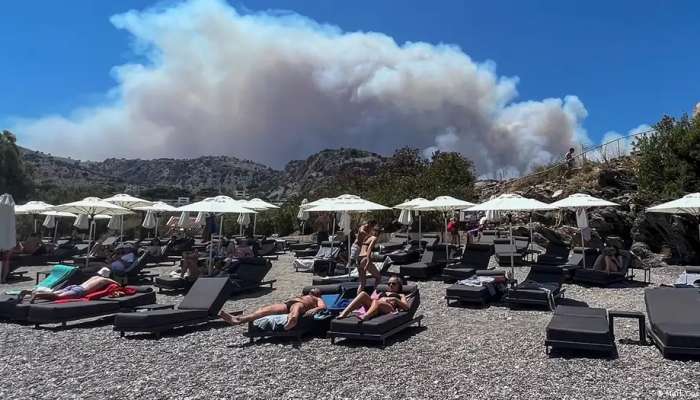
Athens: Greece's heat wave is set to become the longest in the country's recorded history, according to senior official with the national weather institute.
"According to the data, we will probably go through 16-17 days of a heatwave, which has never happened before in our country," Kostas Lagouvardos, the director of research at the National Observatory, told ERT television.
That's as temperatures were forecast to rise above 40 Celsius (104 Fahrenheit) over the next couple of days, which could make it the hottest July weekend in half a century.
"This weekend risks being the hottest registered in July in the past 50 years," said Panagiotis Giannopoulos, meteorologist with state broadcaster ERT.
"Athens is going to have temperatures above 40 Celsius for six to seven days, through to the end of July."
Authorities have been warning people to stay out of the sun during the hottest periods of the day and to remain hydrated.
Greek wildfires
Firefighters meanwhile have been battling dozens of wildfires burning across Greece.
On Friday fire services spokesman Vassilios Vathrakoyannis reported that 52 new fires were burning, while teams were tackling a total of 79 fires.
During the week, firefighters from Poland, Romania, Bulgaria, Malta and Slovakia traveled to Greece to assist with efforts.
Vathrakoyannis said that the country would remain in a state of alert through the weekend amid concerns that strong northerly winds could spark more fires.
US in the grip of 'dangerous, long-lived' heat wave
The southern US is also sweltering with temperatures of 41 degrees Celcius and above this weekend, according to the National Weather Service (NWS).
In Phoenix, Arizona temperatures of up to 46 degrees have been forecast and follows a record-breaking three weeks in a row of highs above 43C.
The NWS on Saturday said that "A dangerous, long-lived, and record-breaking heat wave will continue over the Southwest this weekend," and said low-lying desert areas would feel the heat particularly.
July on track be hottest month
Scientists from NASA have warned that the heat is likely to get worse. Temperatures in June were already found to be the hottest on record, while July was expected to be the hottest month overall.
Scientists from the space agency previously saw a spike in temperatures like this in July and August of 2016 due to a super El Nino event. The current El Nino event has according to NASA, only just emerged.
El Nino is associated with the warming of ocean surface temperatures in the central and eastern tropical Pacific Ocean.
Chinese cities brace for floods
Meanwhile, several cities in China including Shanghai and Beijing are bracing for floodwaters.
There was heavy rain over the financial hub Shanghai on Friday, with precipitation logging 125.4 mm (4.9 inches) within an hour, according to the local weather authority.
The heavy rainfall comes as areas further inland are being scorched by heat, threatening the largest supply of fresh water in the country.